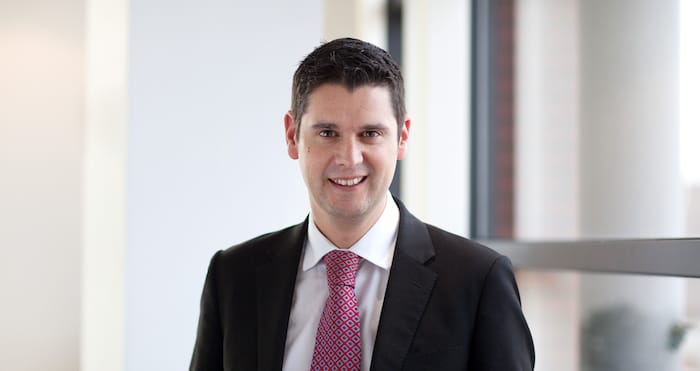Bryn Doyle, an employment partner at Squire Patton Boggs’ Manchester office, talks furlough and restructuring on the high street

Last month’s standoff between Greater Manchester mayor Andy Burnham and Boris Johnson cast a new wave of uncertainty on local businesses, who were left in limbo before the city eventually moved under tier three rules, previously the highest level of COVID-19 restrictions. Then the second national lockdown was announced.
For Bryn Doyle, an employment partner at Squire Patton Boggs’ Manchester office, the announcement was unsurprising, as he points to the soaring rate of infections across the UK. In fact, even before the new four-week lockdown was revealed, he had already told Manchester-based clients to anticipate further COVID-19 restrictions. “It was only going in one direction — it felt like an inevitability to me,” he tells me, ahead of Monday’s (9 November) virtual event.
Doyle now continues to be busier than ever, helping many of his clients, including major high street retailers, grapple with the new measures, which closes pubs, restaurants and non-essential shops until December.
One challenge facing clients is the extended furlough scheme. Having expected the original programme to end last month, many businesses had already served redundancy notices on their employees with October 31 as the finishing date. According to Doyle, now the issue is whether employers should extend the redundancy notice period, rehire and furlough their employees, or whether they should go ahead as planned.
Difficult conversations about redundancy, restructuring and streamlining business are especially important as the new lockdown interrupts the typically lucrative build-up to Christmas. “November into December, as you would imagine, is the busiest period of time for hospitality and retail. To have, at the moment, effectively half of that period shut down for a lot of those businesses can be fatal. So, there’s a lot of planning going on,” explains Doyle, who, before studying law, studied geography at Lancaster University.
Fortunately for businesses in Manchester, earlier restrictions under the tiered system offered an unexpected advantage going into November’s lockdown. “If I look at those clients in the North West, they are maybe two, three or four weeks ahead of where the clients in the South East perhaps will be. They may be a little further down the track when it comes to redundancy consultations, for example,” says Doyle.
Reacting to fast-moving, constantly changing guidance and regulations is no easy task, but it is one that Doyle has dealt with since early March. Looking back at the first lockdown, Doyle explains:
“From an employment law perspective, it was very difficult. For the first time ever really, we had law being created on the hoof — you would have to advise clients literally as the legislation was coming through, which was very unusual. Very rarely does that happen.”
If clear guidance was not given, however, Doyle did his best to predict what could happen, and advise accordingly. If not on client calls, sitting in front of a laptop tracking the latest news updates, Doyle could be found trawling through Twitter, checking for any updates or lockdown hints tweeted by cabinet ministers or other social media savvy MPs.
Dealing Doyle the upper hand here is his early experience with the firm’s employment litigation team, after joining the firm in 2006 (which was then Hammonds and later merged with Squire Patton Boggs in 2011). Defending employers in tribunals across the country taught Doyle to think quickly on his feet. If the judge is firing off complicated legal questions, or a witness says something unexpected, lawyers must adapt and switch arguments and consider the consequences on the spot. “That grounding in litigation helped prepare me for the fast and quick reaction you must give in the current scenario,” he reflects.
But while government guidance and legislation provide “the backbone” to legal advice, Doyle believes it falls on lawyers to translate this into practical steps for clients, who must make quick and tough operational decisions in response to COVID-19. He recalls, for example, the challenge of advising one high street business that, because of the restrictions, meant that only part of the shop could remain open during the first lockdown. As for city offices, Doyle continues to advise businesses on the costs of closing versus staying open.
Meanwhile, tasks that may seem straightforward, such as updating the entire workforce in large businesses, require careful consideration. He says: “How do you communicate with 250 members of staff? What does the letter look like when you have to say, ‘We have to close the office?’”
Ensuring employers take a “fair and balanced approach” in carrying out their legal obligations to employees, particularly with regards to redundancy, is hugely important to Doyle, for two reasons. “Morally, it’s the right thing to do”, he says, “but it also keeps them out of trouble, and avoids any potential claims in the employment tribunal.”
“But it is hard work because we are human beings at the end of the day,” continues Doyle. “We are not immune to it — these are people’s lives and livelihoods that we are supporting our clients to make some really difficult decisions about. We do not take that lightly at all,” he adds.
Seeing employees for who they are rather than as numbers on a spreadsheet and acting sensitively towards them while doing what is best for the client, is part of the problem solving that drew Doyle to employment law in the first place. In almost all cases, reaching a solution requires lawyers to listen, empathise, and importantly, communicate with their clients. Aspiring lawyers as ever should build these key interpersonal skills. “If you are a fair and reasonable person, and sensible, and you are not too hot headed, you will do well as an employment lawyer,” he says.
Looking ahead, Doyle believes the post-COVID-19 world offers plenty of opportunities for employment lawyers. From a retail perspective, the accelerated shift from brick and mortar stores to online shopping will likely see workplace laws change, especially as retailers, like Amazon, rely more on automated warehouse robots and even delivery drones. Doyle, drawing on his experience working in Thomas Cook’s legal department, also suggests we could see a massive surge in hospitality, tourism and travel once a vaccine is found, with people finally taking the dream holiday they had been putting off since the pandemic hit.
From an employee perspective, COVID-19 could see a permanent push towards flexibility. “There is a big move at the moment around sustainability and doing business the right way,” Doyle says. Many businesses, having successfully adapted to remote working, now are left with the question: how do you replicate that flexibility going forward? “For me, that is a real growth area,” he says.
Bryn Doyle will be speaking alongside lawyers and legal education experts from Pinsent Masons, Kings Chambers and ULaw at Monday’s ‘Secrets to Success North’ virtual event. You can apply to attend the event, which is free, now.
About Legal Cheek Careers posts.


